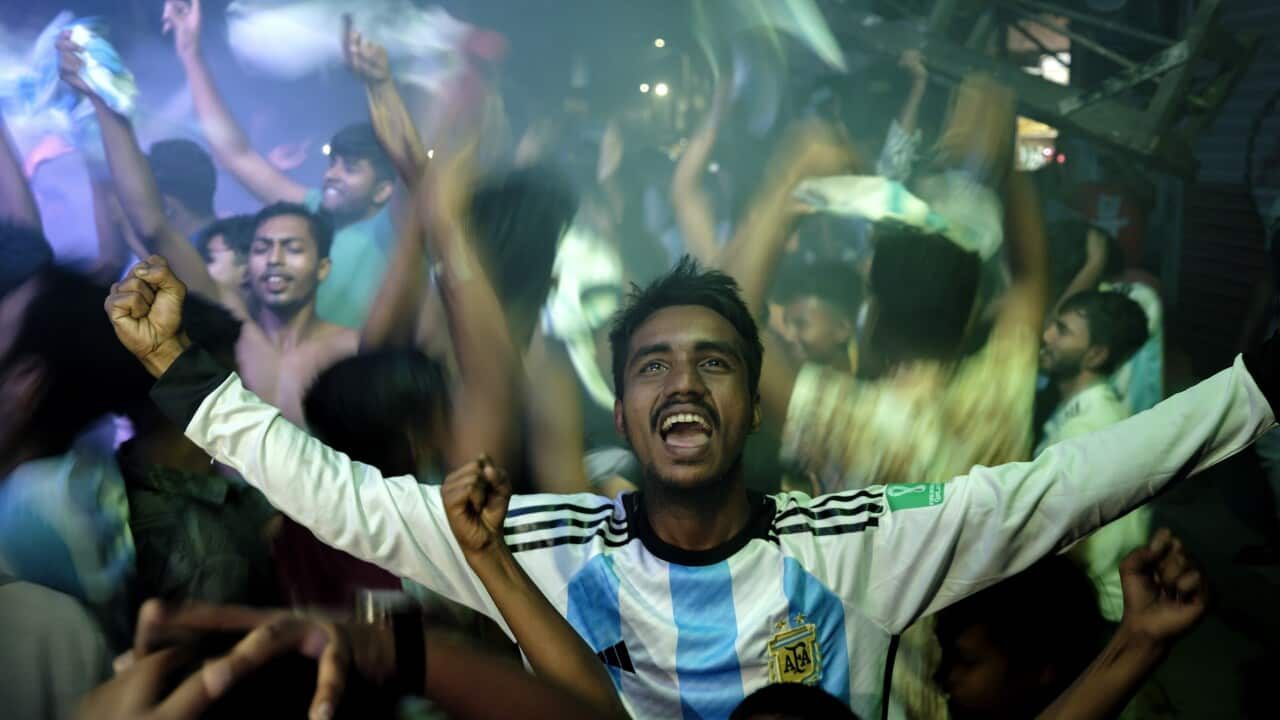Green and red are the colours of Bangladesh's national flag but if you took a walk through the streets of Dhaka this week, you'd be forgiven if you thought otherwise.
Endless stripes of blue and white have overwhelmed Bangladesh in recent days as their unofficial adopted national team .
It's arguably Bangladesh's most unlikely open secret: fans have a wild obsession with the Argentina football team and the man whose name is tied to the squad's success, Lionel Messi.

Thousands of fans packed out live viewing sites in the capital Dhaka to watch Argentina's matches at the World Cup. Source: Getty, AFP / Munir Uz Zaman
People sang, danced, chanted, and cheered through the night as late as 3am: their hero, Lionel Messi, had secured his shot at lifting the World Cup trophy.
Anirban Kaisar was at one of the live viewing sites in Dhaka, where he said there was only one word to describe the scenes as they unfolded: "crazy".
So how has Bangladesh — a country that doesn't share borders or even a continent — forged this connection with Argentina?

Although Bangladesh has never qualified for the FIFA World Cup, many children grow up supporting Argentina and Brazil. This mural shows Argentina greats Diego Maradona (left) and Lionel Messi. Source: Getty / Future Publishing
'It's something magical'
The scene is set for 19-year-old Sydney resident Ikram Ahmed to watch the match of his lifetime.
His garage received a makeover for himself and his friends to watch the World Cup final, in the hopes he can watch his idol, Messi, lift the trophy.
A huge TV screen has been set up, and a flurry of Argentinian-themed decorations are hidden away with plans to overwhelm the make-shift viewing site on Monday night as they play against reigning champions, France.
The young man has no connection to Argentina at all — he is born in Australia and his parents are from Bangladesh.
But he harbours an unmatched love for the La Albiceleste side since he watched the 2010 World Cup.
It was then that Mr Ahmed's father — who lived to experience the legacy of Argentinian 'God' Diego Maradona in the 1986 World Cup — shared stories of how Argentinian football shaped their love for the sport.

Bangladeshi-Australian Ikram Ahmed is a passionate Argentina supporter in the World Cup. Source: Supplied / Ikram Ahmed
When [Lionel Messi] is happy, everyone's happy.Ikram Ahmed
Mr Ahmed draws links between his father's inspiring stories of Maradona and witnessing Messi make history in real-time - describing the generational love for Argentina as a "cultural tradition."
"I can make a correlation between [Maradona] and seeing Messi play while telling stories of his history of Argentina as well. We all want to see Lionel Messi win the World Cup," he said.
"With this top player, you want to see him perform, you want him to win it all. When he's happy, everyone's happy."
Scoring diplomatic goals
For Argentines, it's both jarring and beautiful to witness a country's people with little geopolitical connection wear its colours and wave a foreign flag.
And it's likely the overwhelming love for Messi has garnered diplomatic ties for the two countries to be established.
Last Sunday, Argentina's Foreign Minister Santiago Cafiero announced on Twitter that Argentina will reopen an embassy in Dhaka that closed in 1978.
Since Argentines caught wind of the Bangladeshi passion, they decided to reciprocate the love by supporting Bangladesh in cricket, a sport the south Asian country is passionate about.
Bangladesh's FIFA ranking is low — sitting at 192 from 211 countries — yet fans remain obsessed with football, while cricket is considered its official national sport.
A Facebook page, created earlier this month, '', has already garnered nearly 200,000 members.
"It's something magical because Argentina is far, far, far away from us. It's not even in Asia, but we are supporting them and our country is full of their flag," Mr Kaisar said.
"[Argentines] have been painting our flags red and green in the Argentinian streets. They have been wearing our cricket jerseys. It's an exchange of love."
The on on Monday 19 December from 1.30am AEDT.


